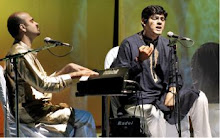The Indian Musical Spirit
ANIL SRINIVASAN
I am going to gush about A R Rahman in this article. Not just because he is the most talented music director and arranger on the block but just simply because he has done us all a phenomenal service – he has proven that we can, as a nation of music-loving, music-making people, find a delicate balance. This is not merely a balancing of styles, tastes and preferences but of perspectives. He has made it possible for us to have the music of our times presented in such a well-organized, classy package. No fuss or frills, but well-conceived music delivered with aplomb. It manages the quintessential amount of lyrical classicism with absolutely edgy, grip-the-corner-of-your-seat contemporaneity. Listening to his music makes me think of yellow autos on New York streets, and skyscrapers reaching the sky in Mylapore all at once. The beauty lies in the fact that Rahman makes such zany collages seem plausible.
I am listening to the track “Kabhi Kabhi Aditi” from Jaane Tu.. on my personal stereo. It is peppy and uplifting. However, what I love about it is its ability to traverse across style and mindsets. It has a moving bass that can appeal to the younger audience, a tidily crafted melodic line that can move the more musically oriented and it has lyrics that are clean, crisply rendered and quite adorable. The overall effect, including the detailing of various nuances of Rashid Ali’s voice (who, if he is reading this, should know he has found a very loyal fan) in the repetitive alaaps in the end are precisely monitored.
I do not know if everyone agrees with this observation, but Rahman is not merely a craftsman representing our spirit. He is the spirit. This is India now, a microcosm of several styles and cultures peppered with tradition and bursting with confidence. This is the India that moves on horizontal time, each individual leading multiple lives and careers. It is the India that believes in possibilities and alternatives, and no longer rushes to linear conclusions to every decision problem. Each of these Indias find an echo in Rahman’s music score. With their juxtapositions of different styles, the mixtures of varied voices and the ever-present surprise element in each song ( a guitar riff that sounds different, a voice that sounds unique or an instrument one does not associate with a certain mood), Rahman’s music truly accompanies the rhythms of our extremely colourful modern-day reality. When Rahman attempts a remix (try “Pon Magal Vandhal” from Azhagiya Tamizh Magan), it still exceeds expectations. A classical infusion (like, “Narumugaye” from Iruvar) works equally well, and an all-out ‘dance the night away’ number (like a “Fanaa” from Yuva) proves difficult to dismiss easily.
When I saw the publicity material for Bombay Dreams near Columbus Circle in New York two years ago, my heart gave a lurch. On that unaccustomed earth, with the wind swirling the temperature down to sub zero, I still felt my face grow warm watching the Broadway crowd crowding up to get tickets to watch an Indian production. Having lived in the United States at a time that world attitude towards all things Indian gradually went through a transformation (from “poor nation with potential” to “knowledge experts and entertainment gurus”), I found Rahman’s music to be a fitting companion score to India’s zeitgeist.
In my ongoing crusade to excite more composers of original sound, and the need for Indian musicians ( classical, film, whatever) to expose themselves to as many global influences and thought processes as possible, I find myself returning to Rahman’s music as perhaps the most important development in Indian sound in a long time. India is a truly global player and its music should be elevated to the greatest heights possible. With our own, extremely evolved classical grammar and our natural curiosity to adapt and assimilate with the global community, I think that the possibilities for Indian music are as expansive as our collective imagination.
Copyright New Sunday Express
Wednesday, July 9, 2008
Subscribe to:
Post Comments (Atom)


4 comments:
Wonderful article! I don't know if its right to ask you but could you share your thoughts on Ilaiyaraja as a composer. I am big fan of both legends-IR & ARR.
I will write a separate piece on Raja soon :)....I am a big fan of both too!
Hi Amazing Article!!! :)I saw Jaane Tu yday and Kabhi Kabhi Aditi has stuck to my lips since then :)
Nice article Anil...
Post a Comment